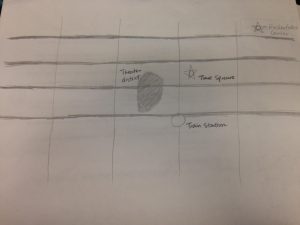Author Archives: jingyu
Zhan_Jingyu_SiteReportII_PartB
Zhan_Jingyu_ReadingRespond#3
Performance/Architecture
An Interview with Bernard Tschumi
In the interview, Tschumi proposes that architecture is about activating space through the movement of bodies. He considers the relationship between architecture and performance is inseparable, since he reveals that architecture is both the space and what happens in it. The performance in space is as important as space itself. In addition, the definition of architecture is connected to space, movement and what happens in it. Architecture consists of concept and experience. One part of architecture is highly abstract, and another part is highly experiential. He also expresses that architecture is perceived through performance which contributes to the understanding of space. The notion of public space can be embodied through space where performance takes place.
Zhan_Jingyu_SiteReportII_PartA
Zhan_Jingyu_ReadingRespond#2
In two articles, both Lynch and Edensor stress the relationship between people and space is critical. Lynch proposes that a city is constructed in space, and people’s perception of the city is important. Edensor argues that the landscapes of television dramas is always associated with characters in order to accomplish the performance, to re-envisage the dramatic conventions. Additionally, they emphasize the process of modification. Lynch states that a city is a product of many builders, and it is ever changing in detail. Edensor considers tourism is a process that needs constant (re)construction of praxis and space.
Lynch also mentions that the environmental images are affected by a two-way process between the observer and the observed objects. From different perspectives of observers, there will be different images. Lynch found that there are five elements to conduct a mental map of a city: nodes, paths, districts, edges and landmarks. By contrast, Edensor underlines the aspect of performance while analyzing tourism. He considers tourism is a form of performance, which allows people to release their “authentic” sides and take on different roles. He suggests that we are tourists much of the time and we can be tourists in everyday travels. Moreover, patterns of tourist behavior are related to class, gender, ethnicity and sexuality.
Zhan_Jingyu_InClassAssignment3
Zhan_Jingyu_InClassAssignment2
When I was on my way to school this morning, first I made a left from my house and kept walking. The traffic lights are smooth today, so I didn’t have to wait for a long time. Then I walked to the food truck to get my breakfast. As I rushed to the subway station, there were a lot of people in the street blocking my way. I made my move difficultly. I waited for the train for three minutes and got on it. The transit of the trains were quick today, therefore I got to jump on the R train just across the platform. It only took 25 minutes to get to school.
Zhan_Jingyu_Reading
Name: Jingyu Zhan
Inventing Times Square
Page 120-132
- Times Square has played a huge part in mixture of residential and commercial tenants.
- Times Square has been closely related to entertainment business in this century.
- The entertainment industry itself and the entrepreneurs made Times Square as the theater district.
- When the legitimate theater moved into Times Square, numerous musicals and plays were produced annually to fulfill the growing demand.
- The transformation of Times Square to an entertainment district was driven by the changes of public entertainment occurred in the century.
- New York was known as the most significant theater district and the theaters contain advanced and various equipments.
- The stock market Crash in 1929 decreased the entertainment of Times Square.
- In the late Depression era, there were different kinds of entertainment provided by Times Square impresarios.
- Times Square always attracted a huge range of spectators from all economic classes.
- There were many different plans for the redevelopment of Times Square, which only provide renovation of theaters. The Urban Development Corporation requested bids from different organizations to embrace a broad range of live entertainment.





